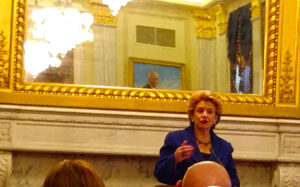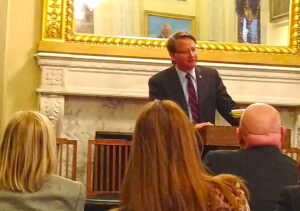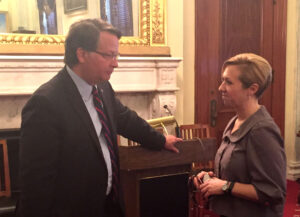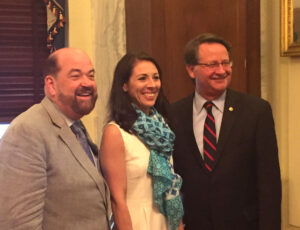
U.S. Senator Debbie Stabenow, D-Michigan, speaks to Michigan Municipal League members in Washington D.C. during the NLC Congressional City Conference Tuesday, March 8, 2016.
A contingent of Michigan local government leaders were in Washington D.C. today to meet with U.S. Senators Debbie Stabenow and Gary Peters on legislative priorities for local communities. The three priorities requested were in the areas of municipal bond tax exemptions; marketplace fairness and online sales tax parity; and transportation funding among other issues.
The Michigan contingent in Washington D.C. this week for the National League of Cities Congressional Cities Conference 2016 was led by League President and Dearborn Mayor Jack O’Reilly; and League Vice President and Grand Rapids Mayor Rosalynn Bliss. Also attending were about 30 Michigan local government leaders, including Lansing Mayor Virg Bernero, Fenton Mayor Pro Tem and NLC Board Member Pat Lockwood; League CEO and Executive Director Dan Gilmartin and Summer Minnick, the League’s director of external relations and federal affairs.
The group has been meeting with various Congressional offices in the Capitol during their visit.

U.S. Senator Gary Peters meets with members of the Michigan Municipal League in Washington D.C. Tuesday, March 8, 2016.
Here are details on the three priorities presented:
- Continuing to have municipal bonds be tax exempt. The tax exempt status of municipal bonds is critical to investment in infrastructure and provides tremendous economic growth in our communities. Eliminating that exemption would harm the future development of critical infrastructure projects and the jobs that come with them. The group encourages the Michigan Congressional Delegation to reject any attempt to eliminate or limit the traditional tax exemption for municipal bonds.
- Support marketplace fairness and online sales tax parity. Last Congressional session, the Senate passed the Marketplace Fairness Act with a vote of 69-27 in a bipartisan manner. This would have allowed state and local governments to collect an estimated $23 billion in online sales taxes, thus ending the online sales tax ‘break.’ However, to great disappointment, the House failed to act before session ended and we are starting over with new legislation this session.
While exact estimates vary, Michigan stands to collect hundreds of millions of dollars from purchases that are avoiding the tax today. This session the bill, S. 698, is sponsored by Senator Enzi (R-WY) and has 22 co-sponsors. Within the past few weeks, Congress passed a bill to, among other things, prevent state and local governments from taxing internet access. As part of getting support needed for that bill, we understand that Senate leaders agreed to have a floor debate on the Marketplace Fairness bill later this year. By failing to pass legislation to bring tax equity in the retail industry, we are punishing those who have invested in our communities. Main Street retailers currently operate at a 5-10 percent disadvantage because they are required to collect sales taxes while remote sellers are not. And, we are leaving billions of dollars on the table which could be used to help invest in other areas for economic growth and/or reduce the deficit. Marketplace Fairness simply allows states and local governments to enforce existing sales tax laws. It does not create new taxes or increase existing ones. The Michigan contingent encourages passage of S. 698 for the benefit of our state and local economies.
- Increase funding for transit and multi-modal transportation. Last year, Congress passed and President Obama signed the FAST (Fixing America’s Surface Transportation) Act, making the first long-term transportation bill in a decade official. There are some wins for local governments within the new law, which is worth approximately $305 billion. However, while there are many positives with the FAST Act, there are still investment needs in our transportation infrastructure. Our nation must continue to make greater investments in transit and multi-modal transportation in order to be competitive worldwide. The Michigan contingent hopes that in having a conversation about increased investment in transportation that we can focus more on all users of transportation networks and not primarily on vehicle users. While the FAST Act was extremely helpful to local communities by providing some stability in transportation funding, the Michigan leaders request Congress for a long-term mechanism for increased funding must still be debated. Additionally, increasing funds for transit and multi-modal transportation is critical to the future prosperity of our communities.
Posted by Matt Bach, the League’s director of media relations, on behalf of Summer Minnick League’s director of external relations and federal affairs. Summer can be reached at [email protected].

